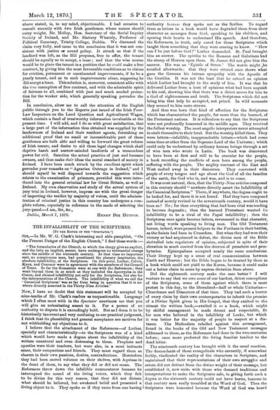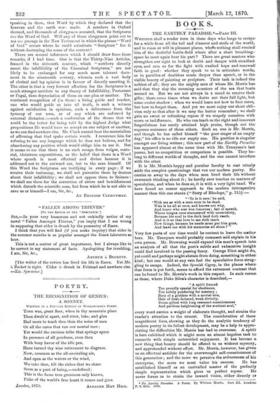THE INFALLIBILITY OF THE SCRIPTURES.
[TO THE EDFfOR OF THE SPEOTATOR.1 SIR,—In Mr. W. G. Clark's interesting and able pamphlet, "On the Present Danger of the English Church," I find these words :— "The formularies of the Church, to which the clergy give an explicit, and the laity an implicit, assent, have undergone no substantial change since the middle of the sixteenth century. At that time no important sect, no conspicuous man, had questioned the plenary inspiration, the absolute infallibility, of the Scriptures. On this point, Luther, Calvin, Knox, and Cranmer were in agreement with the members of the Council of Trent. So far the Romanists were at one with the Reformers ; they went beyond them in as much as they included the Apocrypha in the Canon, and claimed infallibility not only for the Scriptures, but also for the interpretations of the Church. The infallibility of what we call the
Canonical Scriptures' was so far from being in question that it is no- where directly asserted in the Thirty-Nine Articles."
Now, I have no doubt that this statement will be accepted by mine-tenths of Mr. Clark's readers as unquestionable. Language which I often meet with in the Spectator convinces me that you will give an unhesitating assent to it. For a person of no
-authority to dispute it is exceedingly bold. But as I deem it to be historically incorrect and very confusing to our practical judgment, think that its plausibility and general acceptance are motives for mot withholding my objections to it.
I believe that the attachment of the Reformers—of Luther, specially and characteristically—to the Scriptures was of a kind which would have made a dogma about the infallibility of the writers unnatural and even distressing to them. Prophets and apostles were their teachers, but were also, in a most intimate sense, their companions and friends. They must regard them as
sharers in their own passions, doubts, contradictions. Heretofore they had been sacred volumes on their shelves, with Aquinas in the front of them, to say what they did or did not mean. The Reformers threw down the infallible commentator because he intercepted the sound of the living voices, which they felt to be divine for this very reason, that they did not dictate what should be believed, but awakened belief and presented a living object to it. They spoke as if they came from one having
authority because they spoke not as the Scribes. To regard them as letters in a book would have degraded them from their character as messages from God, speaking to his children, and opening their hearts to understand His speech. And therefore, the Reformers, in truth, only cared for those Scriptures which taught them something that they were craving to know. " How can I be just before God ?" Luther demanded. St. Paul brought him an answer. The epistles to the Romans and Galatians had the stamp of Heaven upon them. St. James did not give him the answer. His was an ' Epistle of Straw.' Ile words might ;be recalled afterwards ; that they were uttered once shows what gave the German his intense sympathy with the Apostle of the Gentiles. It was not the least that he echoed an opinion which Luther had brought to the study of him. It was that he delivered Luther from a host 'of opinions what had been anguish to his soul, showing him that there was a direct access for him to a God of righteousness and truth. The Scriptures which did not bring him that help he accepted, not prized. In wild moments they seemed to him mere straws.
And thus was born that kind of affection for the Scriptures which has characterized the people, far more than the learned, of the Protestant nations. It is ridiculous to say that the Scriptures were not profoundly honoured in the middle ages. They received the fullest worship. The most angelic interpreters never attempted to exalt themselvs to their level. But the worship killed them. They were letters—infallible, inapproachable letters—which had come some time or other from the Supreme Lord of the Universe ; which could only be understood by ordinary human beings through a set of wise men who wrote in Latin. The book was discovered to have been at first and still to be oracular for the people, a book recording the conflicts of men born among the people, suffering with the people. The mighty contrast of the East and West melted away in their discourses. They conversed with people of every tongue and age about the God of all the families of the earth, the God who is, and was, and is to come.
It was most natural, then, that the Thirty-Nine articles composed in this century should " nowhere directly assert the Infallibility of the Canonical Scriptures." There, if anywhere, the dogma ought to be looked for, and there it is not found. Had they been composed instead of merely revised in the seventeenth century, would it have been so? No ; for then everything that had been vital was tending to become dogmatic ; then the learned Protestant wanted his infallibility to be a rival of the Papal infallibility ; then the Scriptures once again become letters, reverenced in that character, not living words speaking to living men. The Old Testament heroes, indeed, were present helpers to the Puritans in their battles, as the Saints had been to Crusaders. But when they had won their victory or had acquiesced in defeat, the divine men of the Bible shrivelled into regulators of opinion, subjected in spite of their elevation to much control from the decrees of preachers and pres- byteries. Episcopalians accepted nearly the same conclusions. Their liturgy kept up a sense of real communication between Earth and Heaven ; but the Bible began to be treated by them as a book which could not yield to the Koran, because it could make out a better claim to come by express dictation from above.
Did the eighteenth century make the case better ? I will venture to say that we owe some of our hardest, driest conceptions of the Scriptures, some of those against which there is most protest in this day, to the liberalized—half or whole Unitarian— Churchmen and Dissenters of that time. They had such a horror of every claim by their own contemporaries to inherit the promise of a Divine Spirit given in His Gospel, that they exalted to the utmost the written book,—exalted it as a book, which might by skilful management be made decent and respectable, fit for men who believed in the infallibity of Locke, but which it was better for the majority of people to respect at a dis- tance. The Methodists rebelled against this arrangement, found in the books of the Old and New Testament messages addressed to them, as the Reformers had done in the two centuries before; once more preferred the living familiar teacher to the dead letter.
The nineteenth century has brought with it the usual reaction. The descendants of those evangelicals who earnestly, if somewhat feebly, vindicated the reality of the characters in Scripture, and maintained that their representations of their own straggles and errors did not detract from the divine weight of their message, but established it, now unite with those who demand traditions and interpretations to make the Scriptures safe, in giving forth such a dogma as the sixteenth century could not have borne, because in that century men really trembled at the Word of God. Then the Scriptures were honoured because the Word of God was heard
speaking in them, that Word by which they declared that the heavens and the earth were made. A conclave in Oxford decreed, and thousands of clergymen assented, that the Scriptures are the Word of God. Will any of those clergymen point out to me one passage in the New Testament in which the phrase "Word of God" occurs where he could substitute " Scripture " for it without destroying the sense of the context?
There are several inferences which I should draw from these remarks, if I had time. One is that the Thirty-Nine Articles, framed in the sixteenth century, which " nowhere directly assert the infallibility of the Canonical Scriptures," are not likely to be exchanged for any much more tolerant docu- ment in the nineteenth century, wherein such a vast body of clerical and lay opinion is in favour of directly asserting it. The other is that a very fervent affection for the Scriptures is a much stronger antidote to any theory of Infallibility, Protestant or Papal, than depreciation of them on one plea or another. The continual recognition of (in them) a living guide and teacher, one who would guide us into all truth, is such a witness against satisfaction in opinions, such a deliverance from the tyranny of our own, or of any which are enforced by external dictation ;—such a confutation of the dream that we could be the better for being told by the highest Judge what propositions He would have us accept on one subject or another, as we can find nowhere else. Mr. Clark cannot bear the materialism of affirming that God spake certain words. I reverence him for refusing to use any language which he does not believe, and for abandoning any position which would oblige him to use it. But it seems to me that there is no such escape from vulgar, mate- rial, idolatrous superstitions, as the belief that there is a Word whose speech is most effectual and divine because it is addressed not to the outward ear, but to the man himself. Of this Word the Scriptures are testifying in every page ; if we receive their testimony, we shall not patronize them by decrees about their infallibility ; we shall not oppose them to Science ; we shall use them for the correction of errors and bewilderment which disturb the scientific man, but from which he is not able to save us or himself—I am, Sir, &c.,
AN ENGLISH CLERGYMAN.



































 Previous page
Previous page